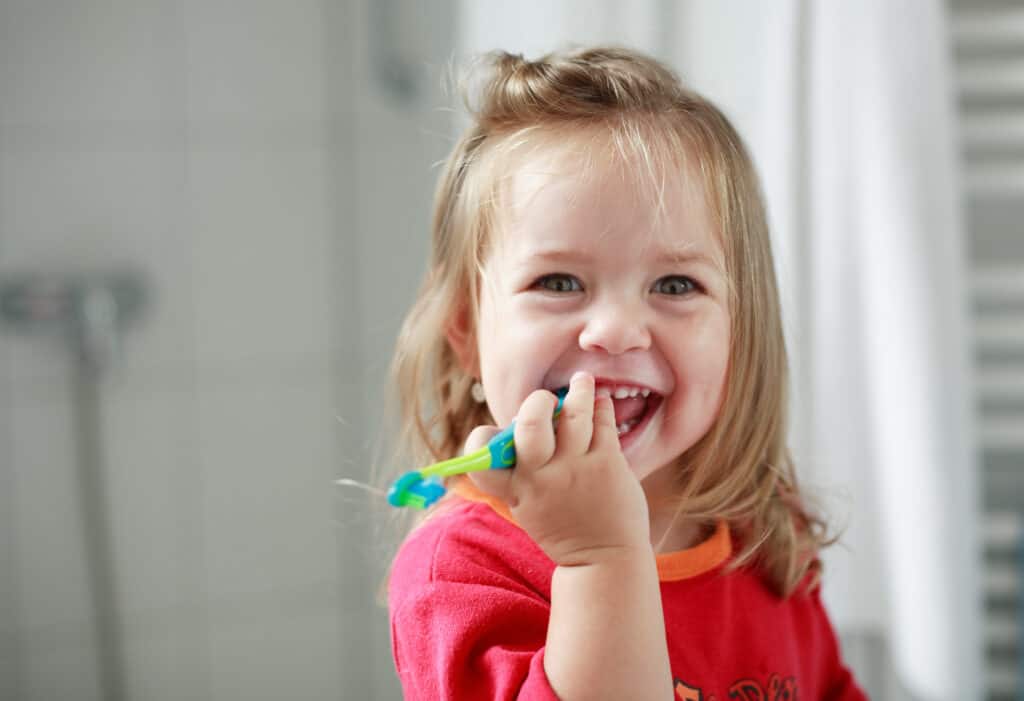Inside: This quick tip is one way to get your toddler to listen and do all of the tasks they sometimes don’t want to do — brushing teeth, putting on shoes, putting on PJs, getting in the car — all of those transitions!
When we say we want our children to listen to us what we are really saying is that we want them to do what we tell them to do. And usually, it’s for their own good, like brush their teeth, go to bed, get dressed, leave the house for a fun activity, eat healthily… the list goes on and on!

So what we are really talking about is compliance– the willingness to go along with our requests. The research on this issue is complex, there are a few ways of looking at it. For more on this, check out my interview on dealing with defiance in toddlers.
The Science of Compliance: What Makes Kids Cooperative versus Defiant?
Research shows that children who have a positive relationship with their parents are more likely to have high self-regulation and that high levels of self-regulation, in turn, is related to better child compliance. (1,2)
This makes sense, if a child is better regulated then they are also better able to pick up toys when you ask them to or to not touch something when you ask them not to and so on. They have better skills to control their behavior. This comes back again to my claim that The Most Important Skill to Teach Children is self-regulation.
But there is more to the story– the willingness to comply with requests depends on both the parent-child relationship as well as the child’s regulation ability. Let’s say your child is less well-regulated. Maybe you have a highly-spirited child who feels emotions in a big way and by the end of the day, well regulation isn’t her strong suit. And that’s ok, regulation is one of the big skills they are learning at this age.
It turns out that when children have a strong positive relationship with their parents, how well regulated they are does not matter as much for compliance (1). They are compliant because of the quality of their relationship with mom and dad.
Researchers call this positive relationship a “mutually responsive orientation.” A mutually responsive orientation is when parents and children are coordinated, harmonious, show warm communication, are cooperative, and show positive emotions to each other. This probably describes most of us on our best days and in our best moments. And also note they are not just talking about mom or dad’s attitude and positivity, but also your child’s attitude and positivity, hence why it’s called mutual. And if we let that sink in for a moment, we can think about situations where we try our hardest to be positive and the kiddo, well, not so much.
Okay, so having a warm positive relationship with your kids will mean that they are more compliant, either because it enhances their regulation or because of our positivity. Got it.
But, here’s the thing– how many of you are feeling warm and connected when getting your toddler to brush their teeth?
When putting on their shoes? Getting ready for bed? Anyone? I’m right there with ya! Even if your child is naturally very well regulated they will still have moments when they aren’t as well regulated. The end of the day when they are tired and your nerves are frayed is a prime time for … well, let’s be nice and just call it non-compliance and certainly less mutual responsiveness.
And for those of us with high-spirited kids — who maybe have stronger emotional responses and hence need more help with regulation, well bedtime can be challenging, to say the least!
So, what can we do in those challenging moments to turn mutual responsiveness back on? Well, we need a little help. Both parents and kids need help at these times and this is when I pull out our listening helper. This simple trick is a way to bring playfulness into those challenging times and end the power struggles.
How to Get Your Toddler to Listen: Action Plan for Parents
The Listening Helper
- A listening helper is one of your child’s favorite toys. For my son it has been a wind-up ladybug, Sheriff from Cars, Skipper from Planes, Rubble from Paw Patrol, well you get the idea. The listening helper helps your child listen and helps you to maintain a positive interaction which will result in compliance.
- Introduce the listening helper to your child and explain that they will help your child listen. Make up a voice for that toy and have the toy ask your child to go through the steps to get ready for bed (or whatever situation you need your child’s compliance). Have the helper be funny and be impressed:
- “Wow, so that’s how little boys brush their teeth! Those are some awesome PJs!”
- Your child will really get into it and will be happy to be compliant with your listening helper.
- Once your child is used to the idea of a listening helper you can let them choose who the helper will be for that night. Make up a slightly different voice, pretend the helper has never seen your child brush their teeth before, be impressed they know all the steps for getting ready for bed, and so on. Yes, I will admit this takes some energy– but it takes far less energy than power struggles and temper tantrums.
That’s my tip for today. It’s a simple one, but it really works! Let me know how this works for you and what situations you use it in below!!!
If you like this tip, you may also like:
The Ultimate Playlist for a Smoother Day with your Toddler
Playful Parenting Through Power Struggles
7 Habits of Highly Playful Parents
Connect with your Children Through (Imperfect) Play
References
1. Kochanska, G., & Kim, S. (2014). A complex interplay among the parent–child relationship, effortful control, and internalized, rule-compatible conduct in young children: Evidence from two studies. Developmental psychology, 50(1), 8.
2. Spinrad, T. L., Eisenberg, N., Silva, K. M., Eggum, N. D., Reiser, M., Edwards, A., … & Gaertner, B. M. (2012). Longitudinal relations among maternal behaviors, effortful control and young children’s committed compliance.Developmental psychology, 48(2), 552.

 Is Your Child a Dandelion, an Orchid, or a Tulip? Understanding Your Child’s Biological Sensitivity
Is Your Child a Dandelion, an Orchid, or a Tulip? Understanding Your Child’s Biological Sensitivity